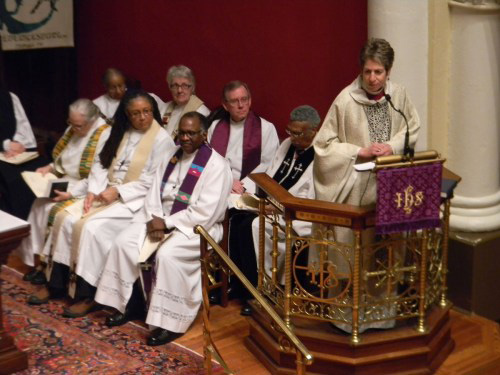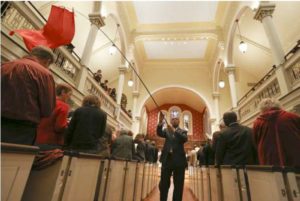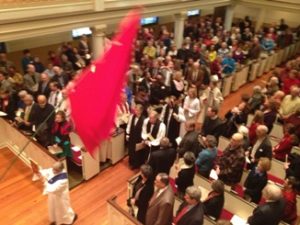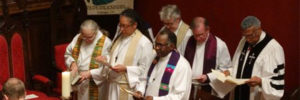
This service was planned by the Diocese Committee on Race and Reconcilition and hosted by St. George’s. Here is the bulletin.


This was a Saturday 10am service with the Presiding Bishop Katharine Jefferts Schori and the Bishop of Virginia Shannon Johnston to commemorate the 150th anniversary of the Emancipation Proclamation. “From Reconciliation to Hope: A Service of Remembrance, Celebration and Witness” included a Litany of Repentance, a Celebration of Hope, and various musical offerings. New Site Baptist church choir participated along with St. George’s choir.
Presiding Bishop Katharine Jefferts Schori reminded those present that “emancipation is another word for the ongoing resurrection we known in Jesus Christ, who continues to set us free.” But, she added, “to discover the depth and reality of that freedom, we must re-encounter it, every day of our lives.”
The presiding bishop spoke of that same transfiguring power in her sermon that God’s spirit continues to set the people free,” said Jefferts Schori.
“Today’s act of repentance is another freshening breeze.” She added, “That breath of God, the spirit of God, will blow away the cloud, that gale of freedom will propel us forward toward the reign of God, if and only if we are willing to let go of anchoring chains that bind us to our own self-centeredness.”

Three priests of the Diocese of Virginia offered their personal reflections on the subject. “Racism will not go away … until we name it,” said the Rev. Kim Coleman, rector of Trinity Episcopal Church in Arlington, Virginia. “Emancipation is … God’s ongoing work of transfiguration through us.
Besides the church service there was a “Witness Walk. “Reverend Lawrence Davies, a former pastor of Shiloh (Old Site) Church and a former mayor of Fredericksburg, joined the current mayor, Mary Katherine Greenlaw, to lead a ‘Witness Walk’ from St. George’s to the city’s former slave auction block on William Street. The walk continued to the unveiling of a sculpture by artist Ayokunle Odeleye to mark the day’s events. Odeleye, a Fredericksburg native, was one of the first African-American students to graduate from the then newly-integrated James Monroe High School.
In the service there was “Litany of Offense and Apology” to “publicly ask for forgiveness for complicity in and benefit from the sin of slavery”
The Bishop of Virginia addresses the people.
Dear people of God: descendants of slaves, descendants of slave masters, and all who have benefited from the systems of slavery and structures of racism, we stand together to express our most profound acknowledgement and regret that the Episcopal Church lent the institution of slavery its support and justification based on scripture, and after slavery was formally abolished, continued for at least a century to benefit from and to support de jure and de facto segregation, discrimination, and racism. The Diocese of Virginia gathers to apologize for its complicity in the institution of slavery and to repent of the injuries done in its aftermath. With God’s grace we will amend our lives, committing ourselves to opposing the sin of racism in personal and public life. We will seek to create a community of liberation and justice.
Therefore, I invite you to join me in recalling the lamentable events that scar our past, and the wounds that continue in the present that we may be transformed more fully into the Body of Christ witnessing to God’s abundant love for all.
Right side O God, be with us, Your Church in the Diocese of Virginia, today. Remembering our past record of a callous and impervious response to slavery and associated sins, this diocese now stands before You in vulnerability and pain. We are reciting the numerous and unconcealed acts that aided the continual presence of the diabolical system of slavery and the related evils of segregation, isolation, the varied forms of discrimination, and racism. This diocese earnestly desires to receive redemption and reconciliation for our previous conduct.
Left side Conforming to both slavery and associated evils is an affront to the teachings of Christ, and for these sins and failings, the Diocese of Virginia ardently seeks forgiveness. O God, may the reciting of these sins and shortcomings help to expiate these transgressions and cast off the shroud of this history, opening a new and unending period of true acceptance and community for all in the Church.
Bishops The arc of the moral universe is long, but it bends toward justice.
Right side This diocese did not support the slave’s cry for freedom and equal treatment, counting slaves as merely three-fifths of a person and frequently disallowing Blacks from even entering a house of God to worship.
Bishops The arc of the moral universe is long, but it bends toward justice.
Left side This Diocese accepted that slavery was integral to the established order, and so, the Church did not oppose slavery, placing us in opposition to God’s desire for all to be free. Rather the Diocese imposed interpretations of scripture upon Blacks as another constituent part of control over slaves. After the end of slavery, the Diocese did not pursue a plan to integrate, and even today, our churches struggle with the fact of largely segregated houses of worship.
Bishops The arc of the moral universe is long, but it bends toward justice.
Right side This Diocese does acknowledge that our clergy and laity owned slaves and benefited from many monetary rewards of physical and financial oppression. Subjugation comes in countless and subtle forms, and for much of our Church’s history, both lay and ordained Blacks were not permitted full participation in the life and councils of the Church.
Bishops The arc of the moral universe is long, but it bends toward justice.
Left side The Diocese of Virginia was not an agent for social change and repeatedly violated St. Paul’s admonition not to be conformed to this world but to be transformed. With slavery and those numerous forms of segregation, discrimination, and racism, we have too often been distracted and weakened by popular and institutional concerns, led away from the instructions of scripture and from the life and words of our Savior.
Bishops The arc of the moral universe is long, but it bends toward justice.
Right side This Diocese exerted authority to separate God’s children in order to enhance Whites over Blacks, leading to arrogance in Whites and degradation for Blacks, so that, even after the legal cessation of slavery, the segregation of Blacks was seen as a normal part of both civic and Church life. Officials and dignitaries of the diocese routinely enjoyed the same privilege that existed in secular circles for the advantaged.
Bishops The arc of the moral universe is long, but it bends toward justice
Bishop Shannon O God, may we, the Diocese of Virginia, by acknowledging manifold sinfulness in the support of slavery and its associated evils, hereby pledge to adopt a new spirit of freedom and respect, leading to redemption and reconciliation, and may we, henceforth and ever, value and love others as we do ourselves.
O God, may You forgive the past and enliven the Church with a transformed and invigorated heart, constant courage, and purposeful wisdom to effect Your enduring will.
All The arc of the moral universe is long, but it bends toward justice. Amen.
Press Articles
1. A Walk for Emancipation
2. Lincoln’s Emancipation Proclamation Recalled at Service
3. From Shiloh Old Site Baptist
4. Ed Jones on the Emancipation Proclamation.
5. Thank you St. George’s for Painting a Rainbow from the Rev. Lawrence Davies.
6. Diocese summary from Emily Cherry
